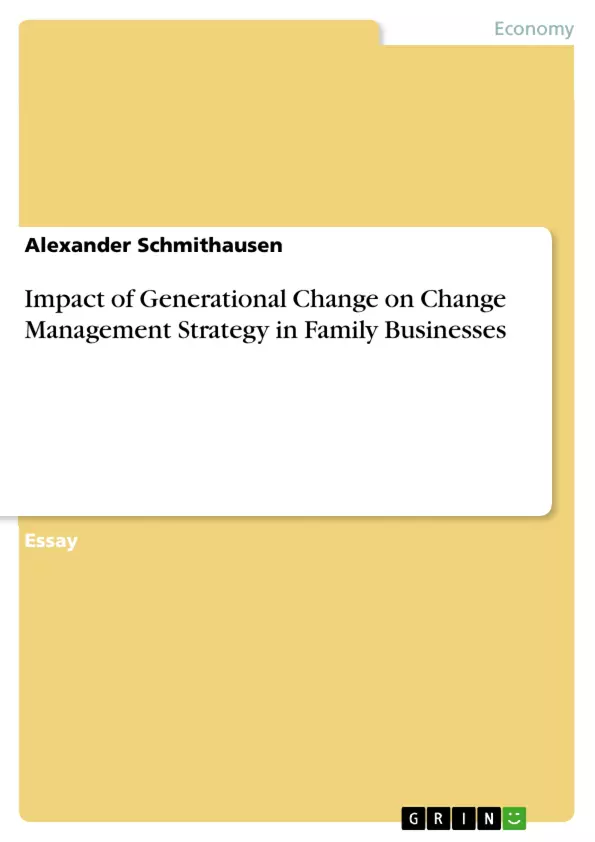This essay examines the issue of organisational change and its management, with specific regard to succession and generational change in family businesses. This short essay attempts to analyse the bringing about of organisational change in family businesses, with specific regard to the impact of succession and generational change upon organisational change management strategies. The essay discusses the rationale for organisational change, describes relevant change management models and furthermore takes up the limitations and challenges of succeeding generations to respond to changing environments and manage change. Use is made of various change management models and succession theories for the evaluation of this study.
Inhaltsverzeichnis (Table of Contents)
- Introduction
- Overview
- Discussion and Analysis
- Rationale for Change
- Important Change Management Models
- Lewin's Model of Change
- Kotter's Change Model
- The Impact of Generational Change on Change Management
- Conclusion
Zielsetzung und Themenschwerpunkte (Objectives and Key Themes)
This essay examines the impact of generational change on change management strategies in family businesses. The essay aims to analyze the challenges and opportunities that succession brings to family businesses, particularly in the context of evolving organizational environments.
- The importance of change management for organizational success
- The specific challenges of generational change in family businesses
- The impact of generational change on organizational structures, relationships, and communication
- The relevance of change management models in navigating succession
- The need for effective leadership in driving and sustaining change
Zusammenfassung der Kapitel (Chapter Summaries)
The introduction provides an overview of the essay's focus, highlighting the importance of change management in the context of family businesses. The overview section delves into the prevalence of family businesses globally, emphasizing the challenges they face in maintaining longevity and adapting to change. This section also examines the specific challenges of succession and the impact of generational change on organizational structures and dynamics.
The discussion and analysis section explores the rationale for change, examining the factors driving the need for organizational adaptation in the face of global economic, political, and technological shifts. The essay then introduces key change management models, including Lewin's three-stage model and Kotter's eight-stage model, emphasizing the importance of leadership commitment, communication, and employee involvement in the change process.
Schlüsselwörter (Keywords)
The core keywords of this essay include: change management, family businesses, generational change, succession, leadership, organizational adaptation, change management models, Lewin's model, Kotter's model, and employee resistance to change.
Frequently Asked Questions
What is the focus of the essay on generational change in family businesses?
The essay examines how succession and generational change impact change management strategies within family-owned organizations.
Why is change management critical for family businesses during succession?
Succession often alters organizational structures and dynamics. Effective change management helps navigate these transitions to ensure long-term survival and adaptation to new environments.
Which change management models are discussed in the study?
The essay refers to Lewin's three-stage model of change and Kotter's eight-stage change model as frameworks for managing organizational transitions.
What are the main challenges for succeeding generations in family firms?
Challenges include responding to changing global environments, managing employee resistance, and evolving communication and leadership styles while maintaining family legacy.
How does generational change affect communication in a business?
Generational shifts often lead to changes in leadership priorities and communication methods, which can impact internal relationships and organizational culture.
- Arbeit zitieren
- Alexander Schmithausen (Autor:in), 2012, Impact of Generational Change on Change Management Strategy in Family Businesses, München, GRIN Verlag, https://www.grin.com/document/199981



